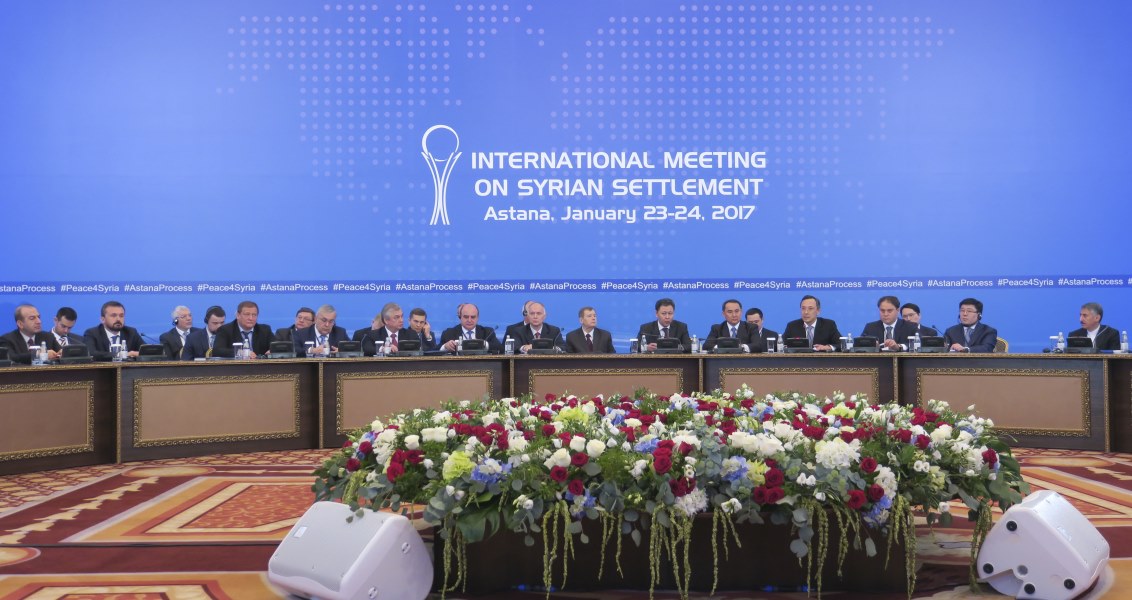
From Astana to Geneva: The Syria Crisis
Whether the current negotiations will be able to solve the Syria crisis is still uncertain, but it is good to see that at least something has started to be done in the name of peace
Share
The agreement that the Russian, Turkish, and Iranian authorities have come to in Astana, Kazakhstan's capital, should be regarded as an important step in the resolution of the Syria crisis. Despite the U.S.'s participation in the meeting at the ambassadorial level, it has basically been set that Russia, Turkey, and Iran will be the main actors in solving the Syria crisis. The Astana meeting is one of the most important stops in the new period, after six years of immense loss and pain that has begun with the normalization of relations and convergence between Russia and Turkey. As I tried to express in various ways before, it would not be correct to present the Astana negotiations as the materialized form of a resolution. The Astana negotiations point to the first time that three actors, with their on-the-ground counterparts, have sat down on the same table to discuss a realistic agenda. In this sense, it points not to a result but to the beginning of a positive process.
The ending of fragmentation, chaos, conflict, and pain that is rampant in Syria today is connected to the actualization of a "lasting political resolution." In other words, the blood flowing in Syria will not stop without a lasting political resolution. Can the Astana process provide this?
Hoping that a political resolution comes out of the first meeting in Astana is either deluded, or an attempt to make the start of negotiations between the sides impossible by raising expectations to the maximum. There are three important stages in front of Russia, Turkey and Iran in the context of resolving the Syria crisis. Without agreeing on the least common denominators first, it won't be easy to solve the Syria crisis in a lasting manner.
The first stage is to bind the open wounds in Syria. Continuing humanitarian aid unconditionally, stopping forced displacements, and strengthening the cease-fire so that it won't be violated in different locations all stand in front of Turkey, Russia, and Iran as the most important issues. In truth, the first meeting in Astana was about covering some distance on this stage.
Indeed, for the first time, the Syrian military opposition and the Syrian regime came together with Iran and Russia on an international platform. Among the requests brought by the military opposition that caused the most debate was that of "Iranian soldiers and Iran-supported militias leaving the country." Alongside this, the military opposition requested that humanitarian aid be brought to besieged areas, that political prisoners be released, and that clarification be brought on what type of sanctions will be enforced on airstrikes.
Considering the agreement that Turkey, Russia, and Iran have arrived at in the Astana talks, it can be said that a great distance has been covered, in what I term the "first stage" of the resolution of the Syria crisis.
The most striking decisions that were taken were the following: Turkey, Russia, and Iran would spearhead the resolution of the Syria crisis as guarantor countries; humanitarian aid would speedily reach their addressees; lessening violence; establishment of a tripartite mechanism for the viewing, supervision, and application of the cease-fire; the sides meeting in Geneva on Feb. 8; armed opposition groups be kept apart from Daesh and the Nusra Front and supporting them to come together under the roof of the U.N. in Geneva; and fighting against Daesh and the Nusra Front in Syria.
Alongside these, emphasizing the protection of the territorial integrity of Syria comes forward as one of the most important elements of the agreement. Of course, a dozen unsolved topics remained unspoken of at the meeting, such as the operations being carried out by the regime, the Barada Valley foremost among them—but nevertheless, there was agreement on important topics at the first stage.
The critical element here will be the attitude of American management. In the days when the entire world is speaking about Astana, the Donald Trump administration's proposal for the creation of a safe zone in Syria was leaked to the press. How this proposal and the Trump administration's probable hardline stance toward Iran will reflect on the positions of the sides in Syria will be clarified in the days to come.
In Geneva, there will be more in-depth discussions about the continuation of the cease-fire, sustaining the humanitarian aid, and ending forced displacement. But after this, debates about the second and third stages of the resolution of the Syria crisis will begin and the sides will begin revising their positions and adjusting to each other. The second stage will be the determination of who the terrorist groups in Syria are and how the fight against these groups will be conducted. For Turkey, the conflict with the PKK's Syrian branches, the People's Protection Units (YPG) and the Democratic Union Party (PYD), will be an important point on the agenda. It is foreordained that Russia and Iran will support Turkey. The third stage is what kind of political transition will occur in Syria. We will speak about the scenarios about this transition process and the different attitudes toward this topic in the days ahead.
[Daily Sabah, January 27, 2017]
Tags »
Related Articles








